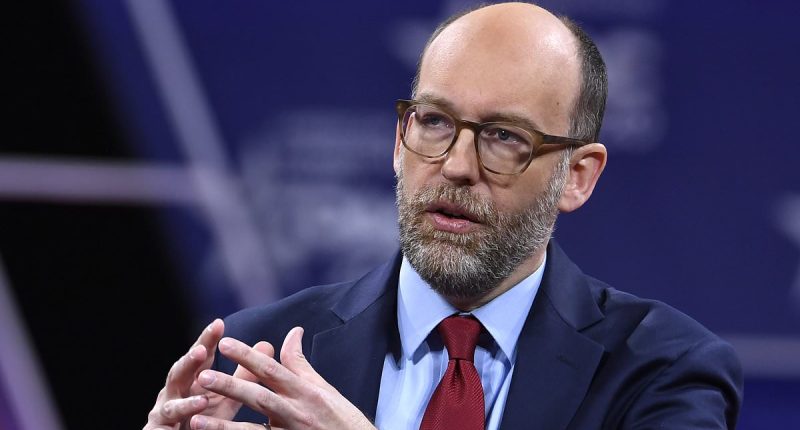Share this @internewscast.com
President Donald Trump’s top budget official is reportedly set to take over operations at the Department of Government Efficiency once Elon Musk steps aside.
Russell Vought, the director of the White House Office of Management and Budget, will soon take on much of DOGE’s workload, including working with Congress to recoup funds, reclassifying federal workers and advancing his proposed 2025 budget – which would greatly slash government funding, the Wall Street Journal reports.
He has already served as Musk’s lower-profile partner, and has celebrated his own department’s efforts to slash government regulations – noting that President Trump had vowed to cut 10 government regulations for every one that is added.
But the pick is likely to draw outrage from Democrats, as Vought was one of the major architects of Project 2025, a hardline conservative manifesto they say is a blueprint for Trump’s second term.
It called for major cuts to Social Security and Medicare, as well as the abolition of the Department of Homeland Security.
Many liberal voters decried the manifesto in the lead-up to the presidential election, even though Trump tried to distance himself from the document.
Still, Trump appointed Vought to serve as his chief budgetary official – and he is now expected to continue with Musk’s drastic cuts to the federal government, which have caused widespread protests as entire departments were shut down.

Russell Vought, the director of the White House Office of Management and Budget and a former architect of Project 2025, is reportedly set to take over operations at DOGE

Billionaire Elon Musk is stepping aside from the department he has overseen since the beginning of Trump’s second administration
In the coming months, it is believed DOGE will focus on regulation cutting in accordance with a February executive order that instructed heads of government agencies to begin rescinding ‘unlawful regulations.’
Vought is also likely to turn is attention to what is called Schedule F, an executive order that Trump issued in his first term to eliminate job protections for thousands of high-level federal employees. The Biden administration blocked the order, but Trump reintroduced it when he retook office in January.
The OMB director is even expected to push Congress to act on Trump’s $9.3 billion rescissions package that would seek to recover funds from the State Department, USAID, National Public Radio and PBS.
But that same desire to slash the federal budget has gotten him in the crosshairs of his fellow Republicans.
Vought has made it a priority to limit military spending increases – putting him at direct odds with Defense Secretary Pete Hegseth.
Under Vought’s plan, increases in military expenditures would only be the result of a process known as budget reconciliation – rather than through the annual budget itself, a proposal of which would keep military spending at its current levels.
Congressional Republicans, though, believed they had received assurances from Hegseth that military spending would once again increase in the next budget and were shocked by the White House’s proposal.
They now worry that receiving just a one-time boost through the reconciliation process would leave the military short in the long run – and are blaming Vought for the discrepancy, according to the Journal.

Vought is already at direct odds with Defense Secretary Pete Hegseth over his desire to keep military expenditures at its current levels
‘Russ has a lot of sway as the OMB director. He’s got a very sharp pencil,’ Sen. Kevin Cramer, a Republican from North Dakota who serves on the Senate Armed Services Committee.
The budget director has previously explained that he wants to halt Democrats’ efforts to demand parity – in which increased military spending is matched with an increase in domestic spending.
That is partially why Vought has favored increasing military spending through the reconciliation process, rather than through the budget process itself, according to the Journal.
Under his initial budget proposal, nondefense discretionary spending would be slashed by $163 billion.
But the plan also proposed adding nearly $120 billion included in pending legislation through reconciliation.

Vought is now expected to continue with Musk’s drastic cuts to the federal government
A spokesperson for the Pentagon has insisted to the Journal that the White House’s proposed budget does increase spending for the military.
Yet the spokesperson also reportedly refused to answer any questions about whether Hegseth believed Vought’s proposed defense budget was adequate or whether he pushed for more funding.
Meanwhile, Sen. Roger Wicker, a Republican from Mississippi who serves as chairman of the Senate Armed Services Committee, said he does not believe that is enough as he slammed the OMB for ‘doing silly math.’






